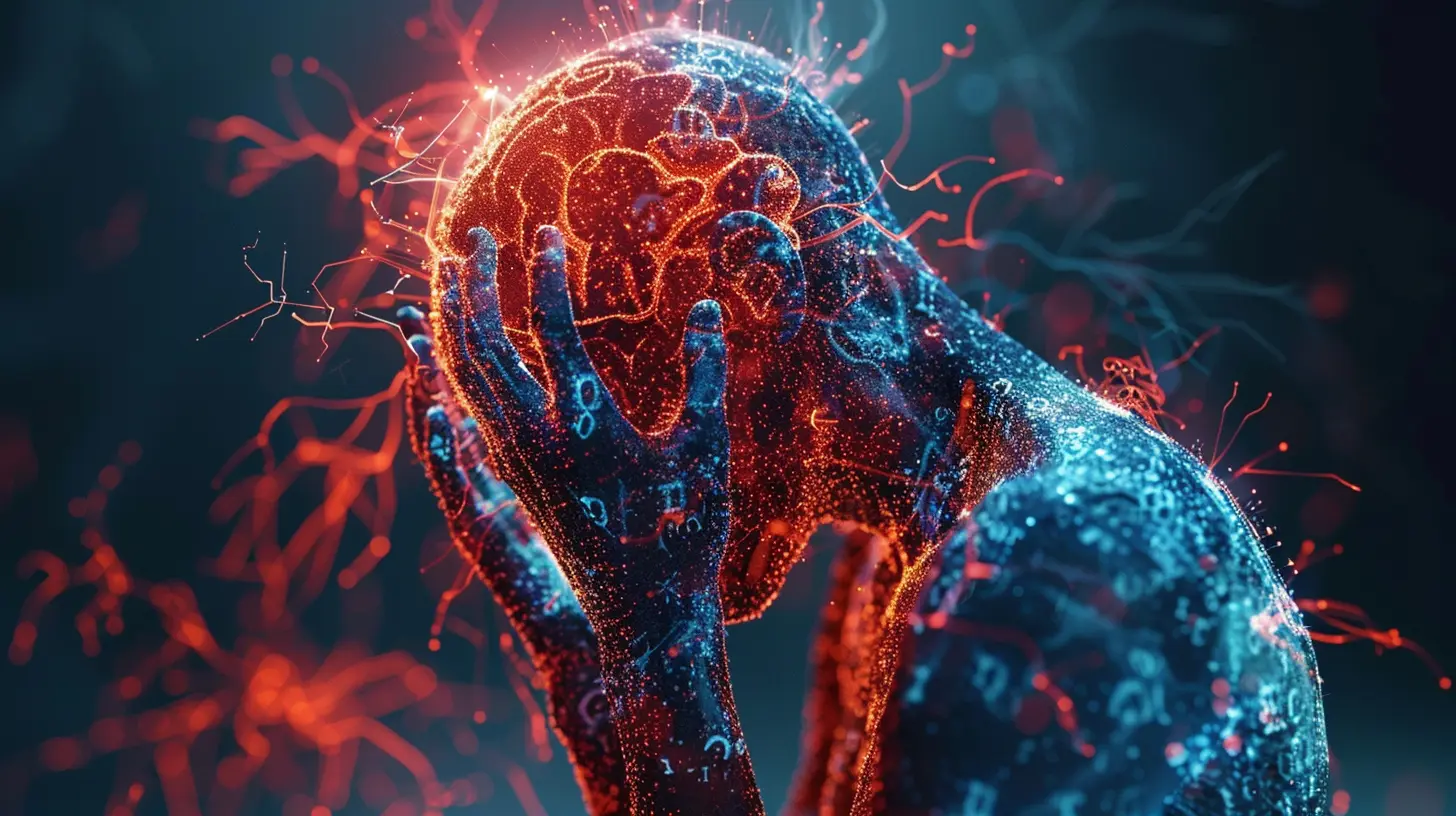The Science Behind Stress: What Happens to Your Brain and Body
14 September 2025
Stress—it’s something we’ve all experienced. Whether it’s a looming deadline, an argument with a loved one, or just the daily grind, stress sneaks into our lives and takes a toll on our well-being. But have you ever stopped to think about what’s actually happening in your brain and body when you’re stressed?
Understanding the science behind stress isn’t just fascinating—it’s crucial. When you know how stress affects you, you can take steps to manage it before it wreaks havoc on your health. So, let’s dive deep into what happens inside your brain and body when stress strikes.

What is Stress?
Before we get into the nitty-gritty, let’s define stress. At its core, stress is your body’s natural response to a challenge or demand. It’s a survival mechanism designed to help you react quickly in dangerous situations. But in today’s world, where physical threats are rare, stress often comes from work, financial struggles, or personal relationships.The problem? Your body doesn’t know the difference between a real life-or-death situation and an email from your boss. That means every time you feel stressed, your body reacts as if you’re being chased by a hungry lion.

The Brain’s Response to Stress
1. The Role of the Hypothalamus
The moment your brain perceives a threat—whether real or imagined—the hypothalamus gets to work. This tiny but mighty region acts like a command center, signaling the rest of the body that it’s time to gear up for action.The hypothalamus sends a distress signal to the autonomic nervous system (ANS), which includes the sympathetic nervous system (SNS)—the system responsible for the famous "fight-or-flight" response.
2. The Release of Stress Hormones
Once the SNS is activated, your adrenal glands start pumping out stress hormones, primarily cortisol, adrenaline, and norepinephrine.- Adrenaline: This is the hormone that gives you an immediate energy boost. It increases your heart rate, raises your blood pressure, and sends more oxygen to your muscles—preparing you to fight or flee.
- Cortisol: Released a little later, cortisol keeps you on high alert. It increases glucose in your bloodstream to ensure your body has enough energy. However, prolonged exposure to cortisol can be harmful.
- Norepinephrine: This hormone helps sharpen focus and increase blood flow to certain areas of the brain, ensuring quick decision-making.
While these hormones are great for short bursts of stress, they can do serious damage over time if stress becomes chronic.
3. The Amygdala: Stress Amplifier
The amygdala, the emotional center of your brain, plays a big role in stress. It detects threats and sends signals to the hypothalamus to trigger the stress response. When stress becomes chronic, the amygdala can become overactive, making you more prone to anxiety, fear, and emotional outbursts.At the same time, chronic stress shrinks the prefrontal cortex, the part of the brain responsible for rational thinking and decision-making. This means prolonged stress makes it harder for you to think clearly, control impulses, or stay calm.

How Stress Affects the Body
Your brain may be the command center, but stress wreaks havoc on your entire body. Let’s break it down:1. The Heart and Circulatory System
Ever noticed your heart pounding when you’re stressed? That’s because stress pushes your heart into overdrive. Increased heart rate and blood pressure can lead to long-term cardiovascular issues, including high blood pressure, heart disease, and even heart attacks.2. The Digestive System
Stress messes with your gut—literally. When your body is in fight-or-flight mode, digestion slows down because survival is the priority, not breaking down food. This can lead to indigestion, bloating, nausea, and irritable bowel syndrome (IBS).Chronic stress can also affect the gut microbiome. Since your gut and brain are closely connected (thanks to the gut-brain axis), stress can cause digestive issues and even worsen mental health conditions like anxiety and depression.
3. The Immune System
In small doses, stress can actually boost your immune response. But chronic stress suppresses the immune system, making you more vulnerable to infections, colds, and even chronic conditions like autoimmune diseases.When cortisol levels remain elevated for too long, they reduce the body’s ability to fight off pathogens, leaving you more susceptible to illness.
4. Sleep and Stress: A Vicious Cycle
Ever laid in bed tossing and turning, unable to sleep because your mind won’t shut off? That’s stress at work. High cortisol levels interfere with melatonin production, the hormone that regulates sleep.Lack of sleep, in turn, increases stress levels, creating a vicious cycle. Over time, chronic sleep deprivation can lead to mood disorders, memory problems, and even cognitive decline.

The Psychological Effects of Stress
1. Anxiety and Depression
When stress becomes chronic, it significantly increases the risk of anxiety and depression. The constant flood of stress hormones alters brain chemistry, making you more prone to mood disorders.2. Memory and Concentration Issues
High cortisol levels damage the hippocampus, the part of the brain responsible for memory and learning. If you’ve ever felt forgetful or unable to focus under stress, this is why.3. Emotional Reactivity
Stress makes you more reactive and less rational. Have you ever snapped at someone over something small? That’s because chronic stress reduces emotional regulation, making you more likely to lose your temper or feel overwhelmed.How to Manage Stress Effectively
Now that we know how stress affects our brain and body, let’s talk about solutions. The good news? There are effective ways to manage stress and reduce its impact.1. Practice Deep Breathing and Meditation
Deep breathing activates the parasympathetic nervous system, the opposite of fight-or-flight mode. This helps lower heart rate, reduce cortisol levels, and bring a sense of calm. Meditation has also been shown to physically alter the brain, reducing stress-related activity in the amygdala.2. Exercise Regularly
Exercise is nature’s stress reliever. It releases endorphins, the body's natural mood boosters, and helps regulate cortisol. Even a 20-minute walk can lower stress levels!3. Get Enough Sleep
Prioritize sleep by creating a relaxing bedtime routine. Avoid screens before bed, keep your room cool and dark, and stick to a consistent sleep schedule.4. Eat a Balanced Diet
What you eat affects your stress levels. Foods high in omega-3 fatty acids, antioxidants, and probiotics support brain health and reduce inflammation linked to stress. Avoid excessive caffeine and processed foods, as they can spike cortisol levels.5. Build Strong Social Connections
Talking to loved ones can buffer the effects of stress. Whether it’s venting to a friend, seeking therapy, or engaging in social activities, strong relationships are essential for emotional well-being.6. Practice Gratitude and Mindfulness
Focusing on what you’re grateful for shifts your mindset. Keeping a gratitude journal or practicing mindfulness can help rewire your brain to focus on the positives rather than stressors.
Final Thoughts
Stress is inevitable, but chronic stress doesn’t have to be. Understanding what happens in your brain and body when stress hits can help you take proactive steps to manage it. By incorporating stress-relieving habits into your daily routine, you can protect your mental and physical health in the long run.So, the next time you feel stress creeping in, remember—you have the power to take control. Your brain and body will thank you!
all images in this post were generated using AI tools
Category:
Mental Health EducationAuthor:

Jenna Richardson
Discussion
rate this article
1 comments
Penelope McCord
This article brilliantly explains the intricate relationship between stress and our brain and body. Understanding these mechanisms can empower us to manage stress better and improve our overall well-being.
September 24, 2025 at 2:44 AM

Jenna Richardson
Thank you! I'm glad you found the article insightful. Understanding the science of stress is key to better management and well-being.


